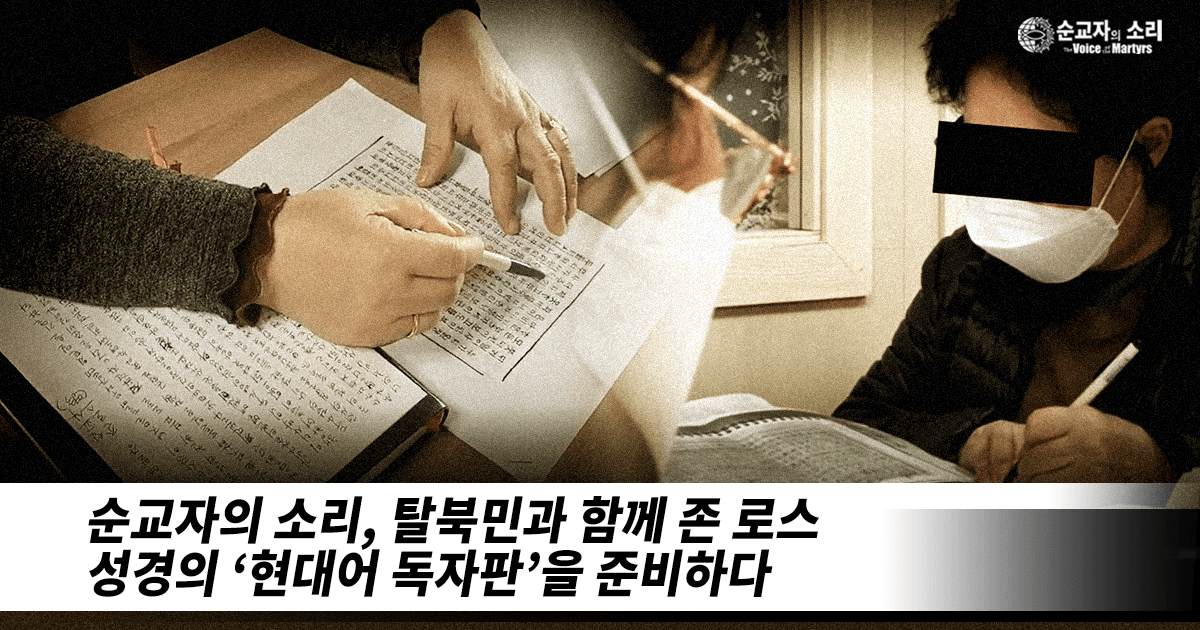
VOMK PARTNERS WITH NK DEFECTORS TO PREPARE “READER’S EDITION” OF ROSS BIBLE
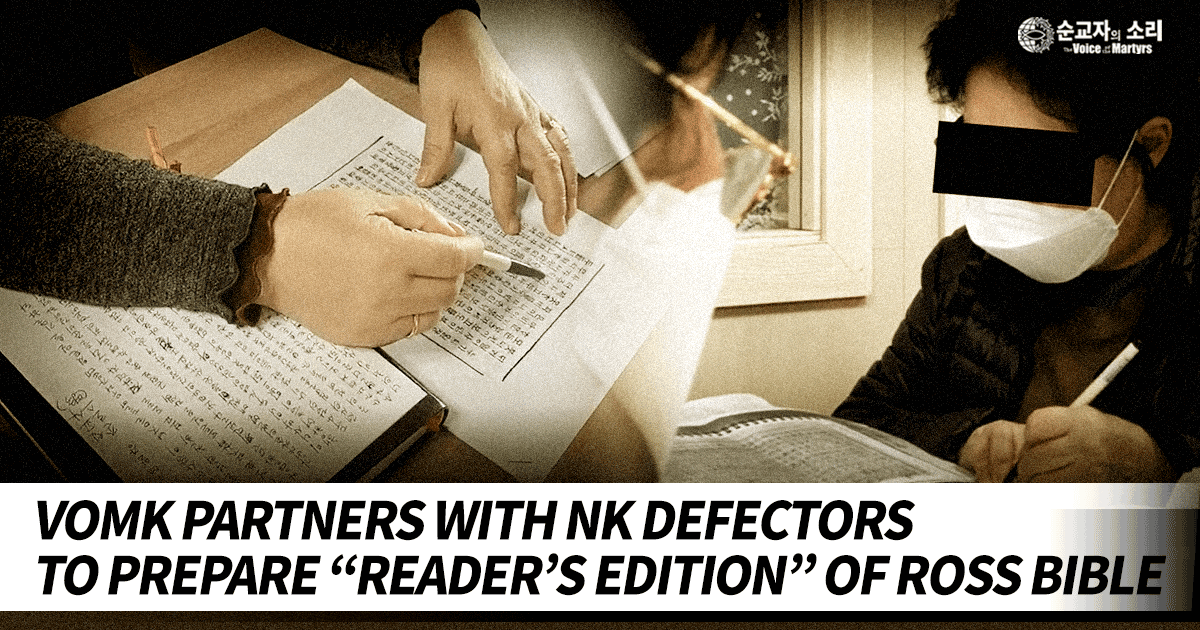
2022 marks the 140-year anniversary of the release of the first portion of scripture ever translated into the Korean language: Missionary John Ross’ Gospel of Luke, first published in 1882 and smuggled into Korea from Moukden, China (today’s Shenyang). Voice of the Martyrs Korea announced today that it is currently preparing a “Contemporary Reader’s Edition” of the Ross New Testament with the aid of its North Korean students and constituents and will be releasing the Gospel of Luke in fall 2022, followed by a Luke/John/Acts trilogy in 2023 and a full Ross New Testament “Contemporary Reader’s Edition” in 2024.
“Today, Korean Christians are able to read the Bible in a large number and variety of translations. Sadly, the one Bible that is not available for them to read is the Bible that has been called the foundation of the Korean Church,” said Voice of the Martyrs Korea CEO Pastor Eric Foley. “The Ross Bible was for two decades the only Hangul New Testament available to Koreans, until in 1900 the first edition of the Korean Authorized Version New Testament was published. The Ross Bible was the Bible of the Korean church during its formative period, and it left a permanent imprint on the Korean church in the form of a church that is Bible-centered and lay-driven. God used the Ross Bible powerfully to impart the saving knowledge of Jesus Christ to the first generation of Korean Christians even before missionaries arrived in Korea.”
An estimated 15,000 copies of the Ross New Testament were distributed throughout Korea and Northeast China by Korean colporteurs and Bible smugglers before foreign missionaries became established in Korea and decided to develop their own Bible translation. “The pioneering missionaries were amazed at the fruit that the Ross Bible produced,” said Pastor Foley. “In 1889, just four years after he first arrived in Korea, H.G. Underwood wrote, ‘Applications for baptism are coming to Seoul to-day by the hundreds from all parts of the land where copies of the [John Ross] gospel have been distributed.’ That was just one of countless reports the missionaries received as churches sprung up wherever the Ross Bible was distributed, in places the missionaries had not yet visited.”
Pastor Foley notes that while the official translation committee ultimately decided to create their own translation rather than to revise and continue to use the Ross version, respect for the Ross translation has grown over the years.
“The translation committee raised various concerns about the Ross translation, including the possible difficulty of adapting the Pyongan dialect, as well as issues about the use and non-use of Chinese, the spelling, the new Korean words the translators created, and even some questions of translation philosophy,” says Pastor Foley. “But in 1960 when the translation committee was working on the new translation of the New Testament, a liaison to the committee from the British and Foreign Bible Society, Richard Rutt wrote, ‘The best piece of [Bible] translation work so far done in Korean was Ross’s’, because of how easy to understand that it was for ordinary Korean people.”
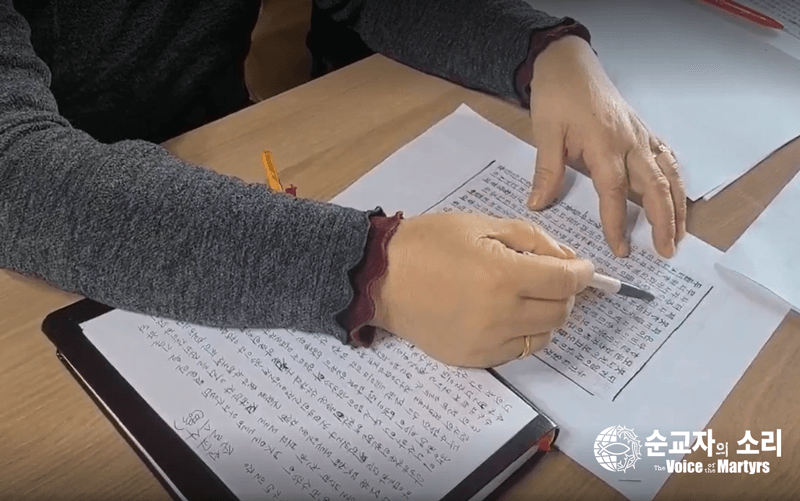
North Korean defector students at Voice of the Martyrs Korea’s Underground University work to update the Ross Bible as part of a “Contemporary Reader’s Edition” marking the 140th anniversary of the first appearance of scripture in Hangul.
Pastor Foley added, “Some scholars have even suggested that the reason why the Ross Bible was not adopted by the translation committee was precisely because it was primarily the work of ordinary Koreans, written for other ordinary Koreans. After all, these were not professional Bible translators. Missionary Ross and Missionary McIntyre were still learning Korean. The many Koreans who were involved in the translation were still learning Christianity. In fact, the reason why they came to Ross and McIntyre was to be discipled. And the way that Ross and McIntyre discipled them was to have them help to translate the Bible.”
Pastor Foley said that his organization’s work in creating a “contemporary reader’s version” of the Ross Bible has given the participants in the project a deep appreciation for how sophisticated Ross’ translation process was. “Missionary Ross and his team may not have been professional Bible translators,” says Pastor Foley, “But when you read the detailed documentation of the steps they went through to ensure both the accuracy and the understandability of the translation, it’s clear that they had a professional process. And when you look at how the Ross translation fundamentally shaped the character of the Korean church, it’s clear that the process was guided by the Holy Spirit.”
Pastor Foleys says that his own motivation for participating in the project comes from a desire to see that spirit return to the Korean church. “Missionary Ross had absolute trust in the sufficiency of scripture to reveal Christ fully. There’s a great story about Yi Song Ha, one of the earliest colporteurs, when he was trying to smuggle Bibles into Korea. He was staying at an inn on the border, and the innkeeper reported to the authorities that he had these books. So Yi had to quickly burn some of the books and then throw the rest in the Yalu River. He was sad and embarrassed to tell this to Missionary Ross. But Missionary Ross responded, ‘Whoever then drinks the waters of the Yalu or lives in the houses on which fall the ashes of burning Bibles will believe in Christ!’ And Ross was right: Christianity spread up and down the banks of the Yalu. Now, with Korean Christianity in sharp decline, we need to recover Missionary Ross’ trust in the word of God. We hope the publication of the ‘Contemporary Reader’s Edition’ can accomplish that goal.”
Pastor Foley says that he has had the goal of publishing a reader’s edition since starting Voice of the Martyrs Korea twenty years ago, but that he and his wife and ministry co-founder Dr. Hyun Sook Foley found that it was a project that professional translators and publishers were reluctant to undertake. “Some told us there would be little popular interest in the book. Others told us that it might be too controversial to publish it. But to me, when I see Korean Christians reading the Message Bible or the Living Bible or some of the other popular new translations, how can it be that the only place to see a Ross Bible is in a museum and the only people who can read it are scholars of early Korean writings? The Ross Bible is how the voice of Christ first came to ordinary Korean people. Ordinary Korean people deserve to hear that voice again today, exactly as it first sounded—or as close to how it first sounded as possible.”
According to Pastor Foley, undertaking the project has required assembling a team and process similar to Ross’. “We have foreign missionaries and bilingual staff who are able to read Ross and McIntyre’s English language notes in order to help track down why certain words or phrases were used. We have people who can look at the Chinese versions that Ross’ team used, which is necessary for solving certain translation puzzles.”
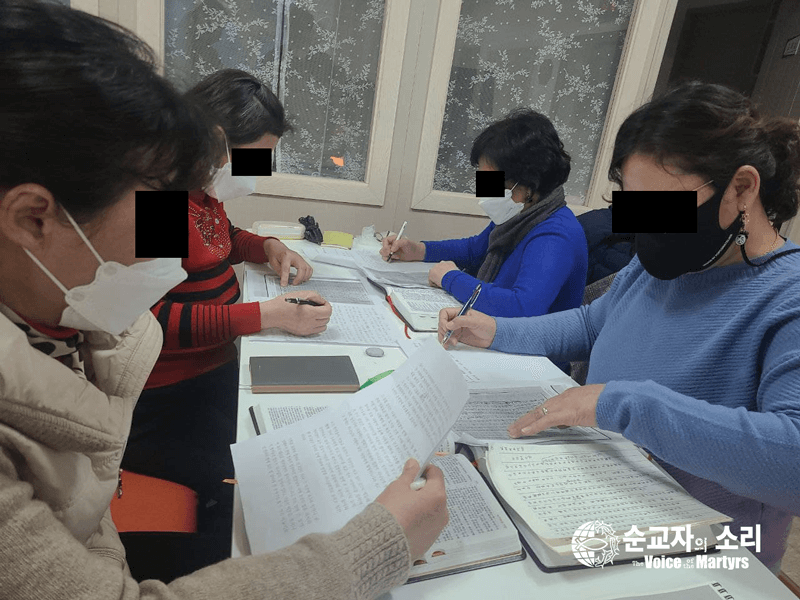
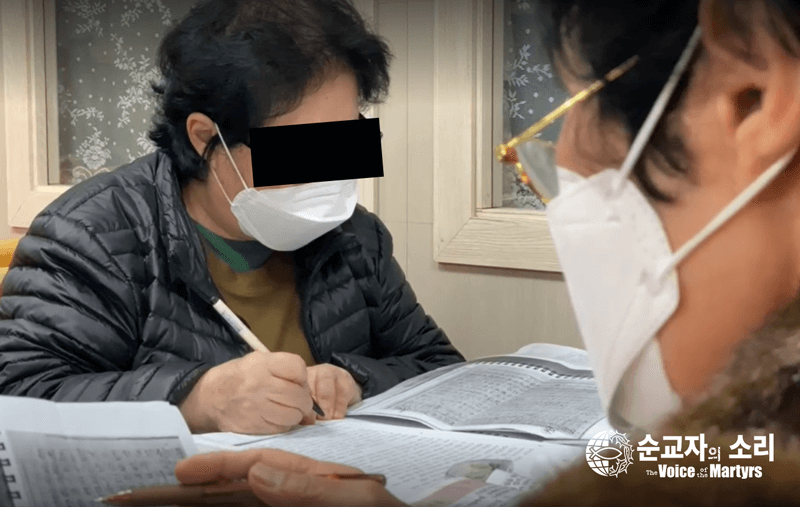
North Korean defector students at Voice of the Martyrs Korea’s Underground University work to update the Ross Bible as part of a “Contemporary Reader’s Edition” marking the 140th anniversary of the first appearance of scripture in Hangul.
But Pastor Foley says that the core members of the team are Voice of the Martyrs Korea’s North Korean students and constituents. “Since the Ross translation was originally done by Koreans from the north and west parts of the country, ordinary North Koreans of today actually can better understand some of the dialect and vocabulary than professional South Korean translators can.”
Pastor Foley says that the Ross Bible project has become the entire curriculum of both of Voice of the Martyrs Korea’s schools for North Korean defectors this year, just as it was for the North Koreans who came to Ross and McIntyre. “Now that we’ve been doing the project for a while, it’s easy to see why Missionary Ross discipled North Koreans by having them translate. Many of our North Korean students get completely absorbed in the work of updating the translation,” says Pastor Foley. “They will work intensely all day and into the evening without taking a break. It’s been the most effective form of ministry we’ve ever done with North Koreans. Missionary McIntyre wrote that during the translation process, his role was mainly to sit back and listen. That’s been our experience, too.”
Pastor Foley added, “I believe God has given North Koreans a particular anointing or gift or connection related to the Ross Bible. One of our North Korean students attends a North Korean defector congregation at a South Korean church. Some of the church members were skeptical about the project. So, she stood up in front of the leaders and passionately shared with them how she encountered God in translating the Bible, and how important the project is to both North Koreans and South Koreans. There were South Koreans there who heard her, and they clapped enthusiastically. One said, ‘I have never heard any testimonies like this one before.’”
Pastor Foley emphasized that creating a “Contemporary Reader’s Version” of the Ross Bible is hard work. “It’s difficult to explain how long it takes, and how challenging it is for the participants,” says Pastor Foley. “The Ross Bible was done before the standardization of the Korean language, so the text represents every word phonetically. You have to sound out the word, figure out what it is, write it out, figure out how it is written today, figure out what the whole sentence is, figure out what words are obsolete, research those—literally every sentence is a challenge. But it drives all of us further into the text, and like our North Korean student said, that’s where you meet God.”
According to Pastor Foley, the goal of the project is to put the Ross Bible back in the hands of ordinary Koreans. “There was a previous effort by a South Korean scholar to update the Ross Bible. It was well done, but the end product was a limited edition hardback book for other scholars, with many footnotes. Our project is designed to more closely mirror the original one: Ordinary North Koreans, assisted by missionaries, putting the New Testament in an inexpensive paperback book format that ordinary Koreans all over the country can read. No footnotes, no scholarly comments, no fancy printing or binding. Just the words of life, expressed in ordinary Korean words through the work of ordinary North Korean people who are learning to follow Christ.”
Pastor Foley says Voice of the Martyrs Korea is scheduled to release the first installment of the project, the “Contemporary Reader’s Version” of the Ross Bible Gospel of Luke, in fall 2022. He says distribution is planned for both North and South Korea.
More information about Voice of the Martyrs Korea’s schools for North Korean defectors is available at https://vomkorea.com/en/project/northkorea/uu-school/.
Those who are interested in donating to the Ross Bible project can make their donation at www.vomkorea.com/en/donation or give via electronic transfer to:
국민은행 (KB Bank) 463501-01-243303
예금주 (Account holder): (사)순교자의소리
Please include the phrase “NK Bible” on the donation

